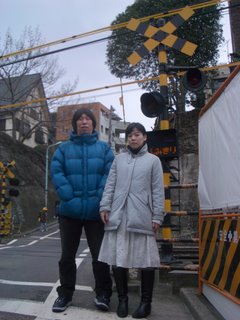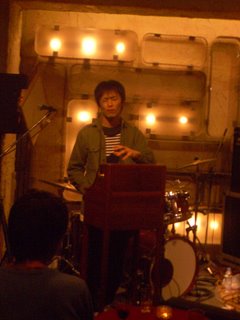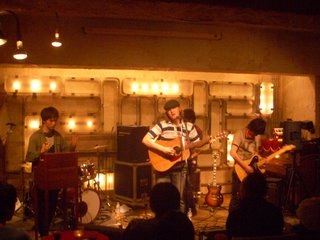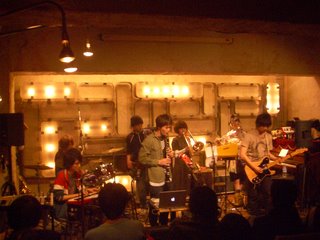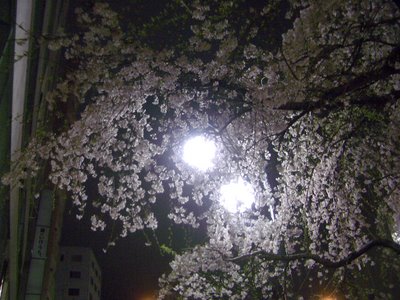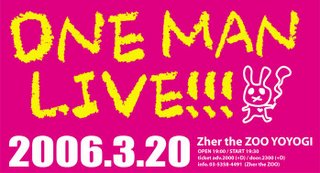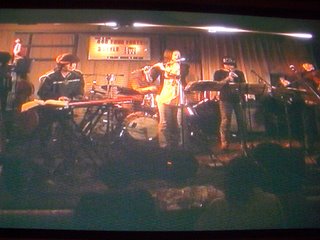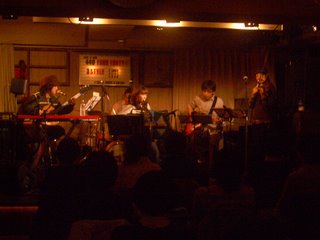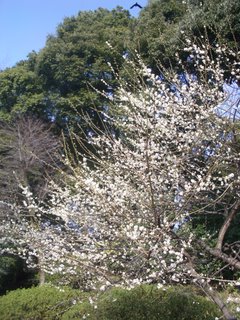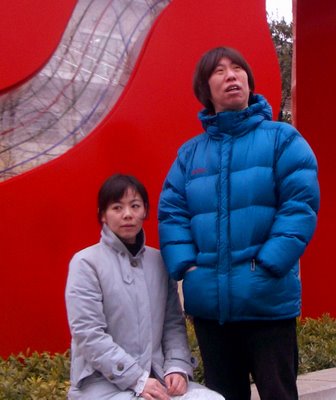
Advantage Lucy, one of Japan’s greatest rock bands, released an album called Echo Park in September 2005, their first full album in four years.
I talked to the band’s two members, vocalist Aiko and guitarist Yoshiharu Ishizaka, about Echo Park, the four years that it took them to finish the album, and their plans for the future, including new albums and possible overseas tours.
***
Japan Live: It’s been six months since you released Echo Park, and in that time you’ve gone on a national tour. What have those six months been like?
Ishizaka: Has that much time passed? I guess you are right. The tour was loads of fun. But I guess we better start by talking about what happened before that, from the night before the album was released.
Aiko: What happened the night before the release?
Ishizaka: I’m trying to remember…
Aiko: I think, rather than thinking, wow, the album is about to come out, we had a mountain of shipment orders for the album and we had to ship them on the day of the release, so things were crazy.
Ishizaka: We were busy in our capacity as Solaris Records [the independent label run by the two].
Aiko: Yes. But then, the album came out, and there was great positive feedback in our BBS and other places, and that made us happy.
Japan Live: So then you went on tour…
Ishizaka: Yes, we went on tour, and it was a really great tour.
Aiko: We had fun, it might have been the most fun we’ve had during a tour.
Ishizaka: The solo show in Nagoya especially stands out in my memory. The first song of that show, Aiko—
Aiko: Yeah, I suddenly choked up.
Ishizaka: She started crying during the first song.
Aiko: Yes. I cried. There was just something very different in the air there. I could really feel that the audience had been waiting for us, and so, I felt happiness.
Ishizaka: But the other members, we were like musicians at music award ceremonies who continue playing even if the singer starts crying, we were like, we’re not going to stop no matter what.
Aiko: But you didn’t look me in the eyes, because you thought you might start crying too! And Tai-chan [Taisuke Takata, who plays guitar for advantage Lucy], I looked over at him, and he was already crying [laughs]!
Japan Live: [To Ishizaka] Did you feel that nice atmosphere in Nagoya too?
Ishizaka: Yes, it was great. While I was playing I thought to myself, the way the stage was small there, and the way the club looked old, in a good way, those things reminded me of a live house in Shinjuku called the Jam, where we used to play in the early days.
Aiko: It had a similar feel.
Ishizaka: The stage is so small, the neck of my guitar hits the wall. That was like [the club Jam] too.
Aiko: Wait, I remember! I choked up during the first song, and then started crying during the second song, “Glider”.
Ishizaka: It was during the second song?
Aiko: Yes, yes. The second song, during that part [sings the instrumental intro to “Glider”, the first song in the album Echo Park].
Ishizaka: You’re right, it was the second song. That reminds me, during the first night of the tour, at the Shimokitazawa Que, when I did the intro to the first song of the night, “Hair Cut”, my guitar was out of tune…
Aiko: From the start?
Ishizaka: Yeah. I didn’t realize it was out of tune until I started playing. That was quite a disaster. It was like, on the first night of our solo tour, the first person to play was me, out of tune…
Aiko: That’s terrible…
Ishizaka: Yeah, it was, and it was an intro that couldn’t be started over. It made me a little depressed, but the other band members looked at me, like, ‘don’t worry about it’, and they made me want to have fun.
Aiko: Osaka was great too. All in all, we had a lot of special energy, because we’d just released an album for the first time in a while, and we were taking that album along with us on a tour where we were the only band playing.
Japan Live: So the Nagoya show was the best in the tour?
Ishizaka: Nagoya was especially good, though the other places were of course fun too. The thing is, Nagoya used to be thought of as a city where the audience never got that excited. That’s what other musicians say too.
Aiko: They say that Nagoya is a hard city to play.
Ishizaka: So it betrayed our expectations, in a good way.
Japan Live: I wonder what the difference was.
Ishizaka: Maybe it’s just that times have changed. Anyway, the tour ended [in early November] and then I had, what would you call it, burnout syndrome until about the end of the year [laughs].
Aiko: But we were busy at the year-end [because they did many shows].
Ishizaka: Yeah, the year-end was pretty hectic.
Aiko: I thought I would die…
Ishizaka: But once the New Year began, I started thinking, ‘I better start writing some songs again’. And little by little, we’ve been recording demos. And, that brings us to now.
Japan Live: How many demos are you working on?
Ishizaka: We have plans to record about ten songs.
Japan Live: And you are working on those little by little?
Ishizaka: Little by little, yes. We’re still at an early stage, and only have fragments of songs, and we need to flesh those out. What we’re doing now is making demo tapes at the same time we’re writing music.

Aiko: I think that the part that is the main pillar for our songs is the melody. I really like songs where you can hum the whole thing, and I think that [making a melody] with one guitar and voice at this stage is extremely important. It’s like, if our songs have a strong foundation [in the form of a good melody], you can pile anything else on top and it would still be okay.
Japan Live: It’s Ishizaka-san who writes the music for advantage Lucy, right? How do you come up with the music? Does it come to you when you are walking around, for example?
Ishizaka: That happens too, and also when I’m casually playing the guitar. Recently, Aiko has been writing a fair amount of music too. And, when I have an image but the melody doesn’t come to me, when I tell Aiko about it, she’s often able to come up with specific melodies.
Aiko: But I don’t like my melodies that much, including their rhythm, and I like it better for some reason when I give the melody to Ishizaka-san and have him sing it in his own way.
Japan Live: So it’s a joint effort.
Aiko: Yes, a joint effort.
Ishizaka: Yes. It’s like Paul and John. And Mick and Keith.
Aiko: We need to make sure we don’t fight [laughs].
Ishizaka: Or maybe we’re more like Morrissey and Marr.
Aiko: That’s not good! We would fight once and then never get back together again.
Japan Live: When the melodies are done to a certain extent, Aiko then writes the lyrics?
Aiko: Yes. Although, recently, I try to write the big theme of the lyrics the moment the melody is created. And then, when the music is all done, I try to put together [the lyrics].
Japan Live: Why do you do it like that?
Aiko: It’s because if I wait too long, the music develops a personality of its own, and I have trouble infusing it with my own emotion. I really consider the first moment when I hear a song important. When I didn’t [come up with a theme for the song right away], I had some songs in Echo Park where I couldn’t write any lyrics for around two years, or others where I re-wrote the lyrics many times because they just didn’t feel right.
Ishizaka: There were some songs where the working title changed many times.
Aiko: Or others that started out as a song in English, but ended up being one in Japanese. When I listen to songs [that Ishizaka writes] for the first time, it’s always a pleasant shock. But when too much time passes after that initial shock, I start thinking, ‘what was that thing I felt?’
Japan Live: So the initial shock is an important thing for you.
Aiko: Yes. I think the initial feeling is a true thing. So, rather than trying to write lyrics about things I usually think about, what ends up becoming my lyrics are things that were sleeping inside me until I listened to Ishizaka-san’s music.
Japan Live: So you don’t really have specific topics that you want to make into lyrics?
Aiko: Not really. Though I’m not sure it’s a good thing that I don’t.
Dream Diary
Ishizaka: Couldn’t you at least keep a notebook of ideas [for lyrics]?
Aiko: Well, I do have some ideas, but I don’t always write them down.
Ishizaka: You don’t have a notebook of ideas, but you do keep a dream diary.
Aiko: Oh, yes, this year I started keeping a dream diary. It’s interesting.
Ishizaka: And didn’t you used to keep a diary that you wouldn’t show anyone?
Aiko: Yeah, I did. That was around 2000, when I was really down, and troubled about things. Rather than a diary where I talk about what happens from day to day, it’s one where I pour out my troubled emotions. So, I myself don’t want to read it again now.
Ishizaka: I see. By writing it down you were sorting things out inside.
Aiko: Right, that’s how it worked. But I was only writing in it at one point in time. It was sometime during the four years before Echo Park came out.
Japan Live: Does your dream diary help you come up with song lyrics?
Aiko: I want it to. But I keep on having weird dreams…
Ishizaka: She has a lot of strange dreams that would never work as lyrics. We were talking today about her latest dream, and it had to do with her being asked to act in a battle scene in a Hollywood movie. And she was given about three lines to memorize, and her partner was the chimpanzee Pan-kun [a chimp that often appears on Japanese television].
Aiko: Yes, it was a movie, but one in which the filming was done non-stop. I was asked to act in it, and I was given two or three lines, and they said here’s your partner, which was a chimpanzee. I was a doctor, and lots of patients were being carried in and I had to examine them. So, I would examine one patient and say something like, ‘this person’s left arm is broken’, and then Pan-kun would write down in his notepad, ‘the patient’s left arm is broken’ [laughs].
Ishizaka: There’s no way that could be turned into lyrics!
Japan Live: It’s very surreal.
Aiko: Yes, lots of weird dreams.
Ishizaka: I mean, a chimpanzee as a doctor’s assistant?!
Lyrics
Japan Live: When and where do you write lyrics? Do you write them at night?
Aiko: When I’m putting the final touches on lyrics I usually go to a family restaurant near my place late at night and work on them until morning. Also, in the bath. I love to take baths, and I’m in the bath for about two hours, and I go in with a pencil and a piece of paper and write lyrics in a relaxed mood. And there’s also a traffic intersection where lyrics often come to me.
Ishizaka: Really?
Aiko: Yes, I told you that before. The intersection of Kan-7 and Koshu Kaido. When I cross the sidewalk there, something comes down to me. It’s on my way home from Ishizaka-san’s house. I got into an accident there too.
Ishizaka: That’s right. You’ve been in a car accident there, and you’ve also witnessed an accident there.
Aiko: It’s a place where things happen for me.
Japan Live: So I guess it’s a dangerous intersection?
Aiko: Very dangerous. There are lots of trucks, and everyone is speeding.
Japan Live: And you get ideas for lyrics there.
Aiko: Yes, I do.
Japan Live: Has it always been the case that you think up lyrics while you are doing something, for example, back in the days when you worked on the albums Fanfare and Station?
Aiko: Yes, oftentimes I’m doing something, like riding my bicycle or taking a bath, rather than sitting at a desk trying specifically to think up lyrics.
Ishizaka: She’s basically not the type of person who can just sit down somewhere and be told to write lyrics and be able to write them.
Japan Live: How about yourself, when you write music? Are you usually doing something else when ideas come to you?
Ishizaka: I used to find it easier to come up with ideas for music when I was doing something else, but I’m the opposite of Aiko, in that I don’t do things unless there’s a deadline. I write music more easily when I have to just sit down and do it.
Echo Park
Japan Live: “Echo Park” is a name of a guitar effect pedal, right? Why did you choose that as an album title?
Aiko: We were looking for a title for the album, which is something that we have trouble with every time, and in particular, this time, it had been four years, so we weren’t looking for a specific noun [for the album title] but some expression that would have broad meaning. The songs too, there were older songs and also songs we’d finished recently, the album covered many years’ worth of work. And the lyrics were about both the future and the past, and covered a lot of territory. So I was thinking, ‘is there anything that would work’, and I went to practice and looked down and next to Ishizaka-san I saw an effect pedal called Echo Park. I thought, ‘that’s great!’ That fits the image I have exactly, and the image of a park goes well with our music too.
Ishizaka: Personally, the image I have is of eleven songs sitting together at a park. They are sitting in a circle, facing each other, and each is expressing its feelings. And those are echoing in this park.
Aiko: Hey, that’s nice!
Ishizaka: That’s the image I’ve had all along. Lots of different feelings, four years’ worth of them, are echoing together. What a profound title, isn’t it?! But you know, in the future I think we should come up with an album title first, and work on the album based on that.
Aiko: I think that would be good too.
Ishizaka: But [the album] we are working on now isn’t like that. As usual, we’re giving it our all on each of the songs, one at a time.
Japan Live: How do you think Echo Park is different from advantage Lucy albums that came out before it, for example in terms of the music, the lyrics, the image and so on?
Aiko: Music-wise I think it’s close to what we did in the early period.
Ishizaka: The album wasn’t produced [by a major record label] so it has a similar feel to when we started as an indie band. We’re recording and releasing music exactly the way we like. When we were at Toshiba [EMI], things weren’t like that, whereas in the beginning we released our own music. I think that’s the difference.
Japan Live: Because four years had passed since the last album, I assume there was a lot of stuff that you wanted to put into Echo Park.
Ishizaka: Yes, and there were lots of songs that didn’t make the final cut. Although maybe we should have put those into the album. You know, the albums I’ve listened to since I was a child can all fit into 40-minute tapes, and so that’s the image I have of an album. When I listen to others’ work, if it’s close to 70 minutes, I feel myself losing my concentration. I feel that 45 minutes are about the limit for keeping the same sort of atmosphere in one album. Though, having said that, Echo Park is a little longer than that. Anyway, I personally want to change things from the next album. Maybe, for example, I can make the album 70 minutes rather than 45 minutes, and make it my challenge to not bore the listeners. Though, actually, that might be a pointless challenge…
Japan Live: Maybe you can make a double album?
Ishizaka: Yes, that might work. I want to do something unusual.
“Mune-Kyun”
During the interview the two used a Japanese expression, ‘mune-kyun’, which I had trouble translating because I couldn’t think of an equivalent English expression. But it was an important concept so I decided to keep it in Japanese. It means something like the way it feels when you see someone you have a crush on, across the street.
Aiko: Our standard for whether to put a song in the album is whether it’s mune-kyun or not mune-kyun. We have many songs that aren’t mune-kyun, but are extremely good.
Ishizaka: OK, so let’s put in songs that aren’t mune-kyun. Like, really cool songs.
Aiko: Or very dark songs. There are many songs where I think, ‘if a super-cool jazz vocalist sang this, it would be an incredibly good song.’
Japan Live: How would you define ‘mune-kyun’?
Ishizaka: ‘Mune-kyun’ is, probably, like a teenage movie. An American one.
Aiko: When the members of the band got together for the very first time, what brought us together was an ad in a magazine seeking a guitarist and a vocalist who like the Cardigans, and what else was it?
Ishizaka: U.K. and U.S. indies.
Aiko: Yes, and at the end, the ad said ‘I love mune-kyun’. And that part puzzled me, because not many people say ‘mune-kyun’ anymore, but when I met everyone and listened to their music, I knew where they were coming from.
Japan Live: It was Fukumura-kun who placed the notice in the magazine, right?
Aiko: Yes. Fukumura-kun. [Takayuki Fukumara, the guitarist who founded advantage Lucy.]
Japan Live: And ‘mune-kyun’ has remained a condition for whether to include a song in albums?
Aiko: Yes, it’s a condition.
Japan Live: How about a song like “Shiosai” [in Echo Park]? Is that ‘mune-kyun’?
Aiko: Yes, that’s ‘mune-kyun’.
Ishizaka: Is it ‘mune-kyun’?
Aiko: Don’t you think? Though it’s a more painful one. There’s a variety of ‘mune-kyun’, and that song might belong more in a category of sadness and pain.
Japan Live: Echo Park starts out in an upbeat way, while the middle part is mellower, and it closes with songs that work well as a finale. Did you intentionally structure the album in that way?
Aiko: I definitely wanted to have “Glider” as the first song and “Spur Line” as the second song, and then Ishizaka-san said why don’t we make “Anderson” the third song and keep it super-lively.
Ishizaka: Right, and that made it three lively songs in a row. And when “Anderson” ended, we thought, ‘ok, that’s enough’, and put in “Akai Natsu” [a quiet ballad]. I wonder what we’re trying to express with the order of the songs. Maybe an atmosphere.
Aiko: But, you know, we have trouble every time with the order of songs in albums, because we have many different kinds of songs. If it were two years ago, we might have made “Shiosai” the first song.
Ishizaka: Yeah, you were saying you wanted to make that the first song.
Japan Live: That would have given the album a very different feel.
Aiko: Yes, very different!
Four Years
The four years that led up to the release of Echo Park were a turbulent period for advantage Lucy. They had left the major label Toshiba EMI to form their own independent label, Solaris Records. But during that period drummer Kaname Banba went on a long break from the band for medical reasons, and in the end, quit. Then in November 2003, Takayuki Fukumura, the band’s founding member and former guitarist, passed away of heart disease, only 28 years old.
Japan Live: What were those four years that it took you to finish the album like?
Aiko: I was constantly troubled about things.
Ishizaka: About what?
Aiko: What was I troubled about…? The biggest thing was, the question of what I would be able to express [through music]. People around me all said you need to just continue producing things, and I agreed with what they said, but I wasn’t deciding myself which direction I wanted to go, and I couldn’t come up with answers. And in that kind of environment, I was able to make music, but I felt a lot of resistance toward releasing it. And I had trouble coming up with lyrics. What were you doing during that time?
Ishizaka: Uh, I’ve forgotten. What was I doing? But in any case, it was good that Echo Park came out.
Aiko: Yes. But if there wasn’t that four-year blank period, we probably wouldn’t have been able to make that album. During that period, there were the matters of Banba-san and Fukumura-kun, and in the end those two things pushed us to walk down our own path.
Ishizaka: You’re right. It was hard to sort things out emotionally after those two incidents.
Aiko: Yes.
Ishizaka: We needed time.
Japan Live: During those four years, did you ever think about taking some time off from advantage Lucy?
Ishizaka: I never did, no.
Aiko: No, I didn’t want to take a break. I wanted to continue with it. But I was very stressed out, so, for example, I kept a secret diary [laughs].
Japan Live: But you continued to do shows during those four years.
Aiko: Yes. And we met Sotomura-san. [Kimitoshi Sotomura, drummer of the band Sherbets, who also now plays drums for advantage Lucy.]
Japan Live: Echo Park contains many songs about the passage of time, and about loss and discoveries.
Ishizaka: You are right.
Aiko: That’s something that couldn’t be avoided. We needed to have those things in our lyrics. But because we were able to make those lyrics and songs, the next road opened up for us.
Next Album
Japan Live: Will your next album go in a different direction than previous albums?
Ishizaka: Yes, we’ve been thinking about that. We talk about this as we make songs. If a song flows in a certain way, we can continue with that flow until the end, or we can suddenly change directions. Until now we’ve been making relatively straightforward songs, but we sometimes think maybe we can make songs in a slightly different way, or we can try things that advantage Lucy would have never done before.
Japan Live: So, for example, you might make a song whose mood changes in the middle?
Ishizaka: Yes. We haven’t really done songs like that before.
Aiko: Even though we like songs like that.
Ishizaka: But we’re not trying to be too brainy either.
Aiko: I think it’s just that we’re able to cover more ground. We’re doing things on our own and we feel freedom.
Japan Live: I assume you’ve just started on your new album, but in what ways do you think it will be different from Echo Park? Do you have any goals?
Ishizaka: I think it will be an album that is very free, emotionally.
Aiko: Yes, because now there isn’t anything that is getting in our way.
Ishizaka: With Echo Park, we looked back, at a time when we needed to look back. We really needed to review things. But because we’ve finished that, we’re free emotionally. And that makes us want to try things that we haven’t done before.
Japan Live: Have you found new musical influences recently?
Ishizaka: One thing that opened up my mind is Cat Powers’ new album. What was it called? Oh yes, The Greatest. That’s a free-sounding album.
Aiko: It’s good.
Ishizaka: But Cat Powers still hasn’t strayed from her roots. The way she is relaxed, the way she expresses her emotions so freely. She’s influenced me, though our music is different from hers. But it’s good stuff.
Japan Live: Advantage Lucy started out as a band of people who liked New Wave and Swedish pop. Have your influences changed since then? Were there any particular artists you listened to a lot when making Echo Park?
Ishizaka: Well, this is something I heard from someone, but when you start out, you study under a teacher, as an apprentice. And, eventually, you gain independence, but at that point you are still influenced by your teacher’s skills, and you haven’t established your own. But when you break through that, you finally become someone. In the case of advantage Lucy, bands like the Cardigans and the Smiths were our teachers, but now we want to take the next step. Advantage Lucy started out influenced by them, but now we are trying to break through that shell. And, then, I think there will really be a genuine band called advantage Lucy. So, in that sense, while of course listening to others’ music influences us, an even bigger thing for us now are things like musicians’ attitude. That influences us more. Cat Powers is like that, and so is a percussionist named Tomo Yamaguchi. He’s someone with real personality, he makes his own percussion instruments. He’s a session musician, and appeared on TV with UA, on a kid’s program. And because he’s so straight and modest when it comes to music, he’s able to express what he feels very powerfully. People like him have been influencing me. I mean, there’s a Lucy in the minds of others, and there’s our own Lucy, right?
Aiko: Yes.
Ishizaka: Well, I want Lucy to satisfy people’s expectations. But as artists, we might be trying to take our own Lucy in a direction that is contrary to people’s expectations. But, I really like our fans, and so I wonder if we’re doing the right thing, but then when I meet artists who are exceptional, they give me power. In Aiko’s case, she likes art, and goes to museums a lot.
Aiko: Yes, we went together to this exhibition of art by Olafur Elisson that looked at light as a theme, and it was great. When I see things like that, I get the desire to create music that would go well with such art.
Ishizaka: At the exhibition of light there was this interesting room that was all orange light, and when you go inside the room everyone appears black and white.
Aiko: It’s just an orange-colored, square room, but when you go in, you turn black and white.
Ishizaka: Right, it’s very interesting. And, the Aiko I’m looking at now turns black and white, and looks like someone from the past. This is art about how I respond when I see Aiko like that: it makes me think things like, here is this person that I’m in a band with, and I’m always making her worry, but I better treat her with more care…
Aiko: [Laughs] What?
Ishizaka: I’m saying that’s an example of how that sort of art makes you feel. It’s a simple thing, but by making you look at things in a different way, it creates something interesting. It gives me hints on how, when making our own music, maybe if we try this or that it might be interesting.
Japan Live: Do you think people won’t accept it if you started making music that is contrary to their expectations of what Lucy’s music should be like?
Ishizaka: I actually think, no, people won’t be turned off. I mean, we’ve always given it our all and have always been completely satisfied about our work, and have lots of confidence, but if we become less focused on entertainment and really showed who we are, I think people who truly like our stuff would be impressed. We’ll be able to betray people’s expectations in a good way.
Aiko: But you know, we’re making some good songs.
Ishizaka: Yeah, they’re pretty good. I’ve been saying a lot of stuff, and earlier I was saying that we would be moving away from our teachers. One thing I’ve wanted to do is to focus on making three-minute pop songs. But…that’s what the Smiths were about [laughs]! So, I guess in some ways we are moving away from them, and in other ways we aren’t, but in any case our songs were getting a little long recently.
Aiko: So we’re aiming for three minutes. Though one song is already longer than that…
Ishizaka: Well, I think that song is fine like that. But if we think, ‘this song should be three minutes’, we’ll cut as many of the parts as needed, and will really tighten it.
Japan Live: You said before that this year you are aiming to release two albums.
Ishizaka: Yes, two.
Aiko: We will work on two. But can we release two?
Ishizaka: Of course we can! If we don’t work with that mindset, we can’t release two. There’s no more ‘four year blank period’ for me.
Aiko: No, of course not. Of course we will release one album this year, but there’s one other theme we are thinking about for an album, and do you think we will be able to release it this year too? Will we make it?
Ishizaka: Well, probably not.
Aiko: But we will start making it this year, probably.
Japan Live: Why are you thinking about making two albums? Will the two be very different?
Ishizaka: Well, I like light bulbs, and I told Aiko I want to make a mini-album with light as a theme.
Aiko: And I really like things like that, so I thought we should make that one theme in our shows, and choose the right venues, and make it into something where art and music unite. But if we do that as part of our usual solo show, we will want to do our usual upbeat songs too, and the audience will also be expecting those songs, and then the atmosphere wouldn’t be right. So we thought it would be best to divide the shows into two types, and if we were going to do that, we felt it would be clearer if we made two albums too.
Japan Live: So one of the albums will have that as a theme?
Aiko: Yes, it might become a little experimental.
Japan: You’ve been doing shows at a lot of different, interesting places recently.
Aiko: Yes. We haven’t done many shows at normal live houses recently, proportionately speaking.
Ishizaka: Yes, but we’ve been doing mostly acoustic sets these past two or three months.
Aiko: Acoustic sets are good because they require a lot of focus. You know, there are old buildings across the country, I’d like to visit them and do (acoustic) shows in them.
Japan Live: A national old building tour?
Aiko: That’s right. I’d like to. (The show we did) at a temple was good too. It was in a big space with a floor of tatami mats, and behind us was a shiny altar, and everyone was sitting on the floor watching the show.
Japan Live: Where was that show?
Ishizaka: In Hiroshima. The sake was delicious there. The sweet sake too, it was very delicious.
Aiko: It’s because they make it there.
Japan Live: By doing shows in new types of locations where you’ve never played before, are you trying to show the audience new things too?
Ishizaka: That’s what we want to do with the other album, while with the album that will be the sequel to Echo Park—well, not really a sequel—its extension—well, not an extension either...
Aiko: Standard Lucy?
Ishizaka: Standard? I don’t know if that’s the right word either. Maybe, the main one.
Japan Live: Will that main album come out first?
Ishizaka: Yeah, we will need to release that one first. We’re going to be busy from now on.
Playing Abroad
Japan Live: You’ve already been to Seoul twice, will you be playing abroad more?
Ishizaka: Yes, we will continue to go abroad. We want to do a lot abroad.
Japan Live: You might be going to Taiwan around May?
Aiko: Maybe. But it’s still undecided. We will be going to Korea in April though.
Ishizaka: We will go to Niigata then too. And we want to go to the U.S. and Europe.
Japan Live: I get e-mails from Lucy fans reading my website who are from China, Hong Kong, Taiwan, Korea, Indonesia…
Ishizaka: Indonesia! Wow.
Japan: And the U.S., Canada, Brazil, Spain.
Aiko: That makes us happy.
Ishizaka: The Internet has made me think, since I was born on earth I want to go to all sorts of places while I’m alive. I don’t want to die without having seen the Pyramids. You know?
Aiko: That’s right.
Ishizaka: Or, is it really okay to die without having seen the Himalayas? Though, I can go on endlessly like that.
Japan Live: Do you have any specific plans yet to play abroad?
Aiko: No, nothing yet.
Japan Live: Where do you want to go most?
Aiko: On tour, right?
Ishizaka: The Maldives [laughs]? That wouldn’t be a tour, it would be just travel.
Aiko: If on tour, England, for one.
Ishizaka: Yeah, Europe. And the U.S. too. Because we’ve been influenced by music from the U.S., England, and Spain and France too. I want to go to Manchester and Glasgow. And San Francisco and LA. I’ve only been to the East Coast of the U.S., Washington and New York.
Japan Live: The West Coast is nice and warm.
Ishizaka: Yes, and Aiko looks every day at the Panda Cam of the San Diego Zoo.
Aiko: Every day.
Ishizaka: It broadcasts Internet images of pandas, pandas sleeping, pandas eating bamboo…
Aiko: And being fed milk. It’s incredible.
Japan Live: Well, you should definitely go to the West Coast.
Ishizaka: If any promoters are reading this, please invite us [laughs]! We won’t ask for much.
Japan Live: Do you have anything you want to say to your overseas fans?
Ishizaka: Thanks so much for supporting a band like us, from an island nation like ours. We want go to your town some day. Please call for us with a big voice.
Aiko: It makes me so happy that people like you from a distant land say you like us. I want to meet you and shake your hand.
